引子:浏览器输入地址访问springboot controller 都经历了什么?
域名解析先不谈,springboot 使用的是内嵌tomcat作为web容器。而tomcat 使用的是Nio 处理 http1.1 ,经过层层过滤器最终到达servlet ,然后走的是servlet 生命周期。
spring 只不过是配置过滤器,封装请求,设置上下文,请求调度等
site:tomcat.apache.org Architecture
https://tomcat.apache.org/tomcat-8.0-doc/architecture/index.html
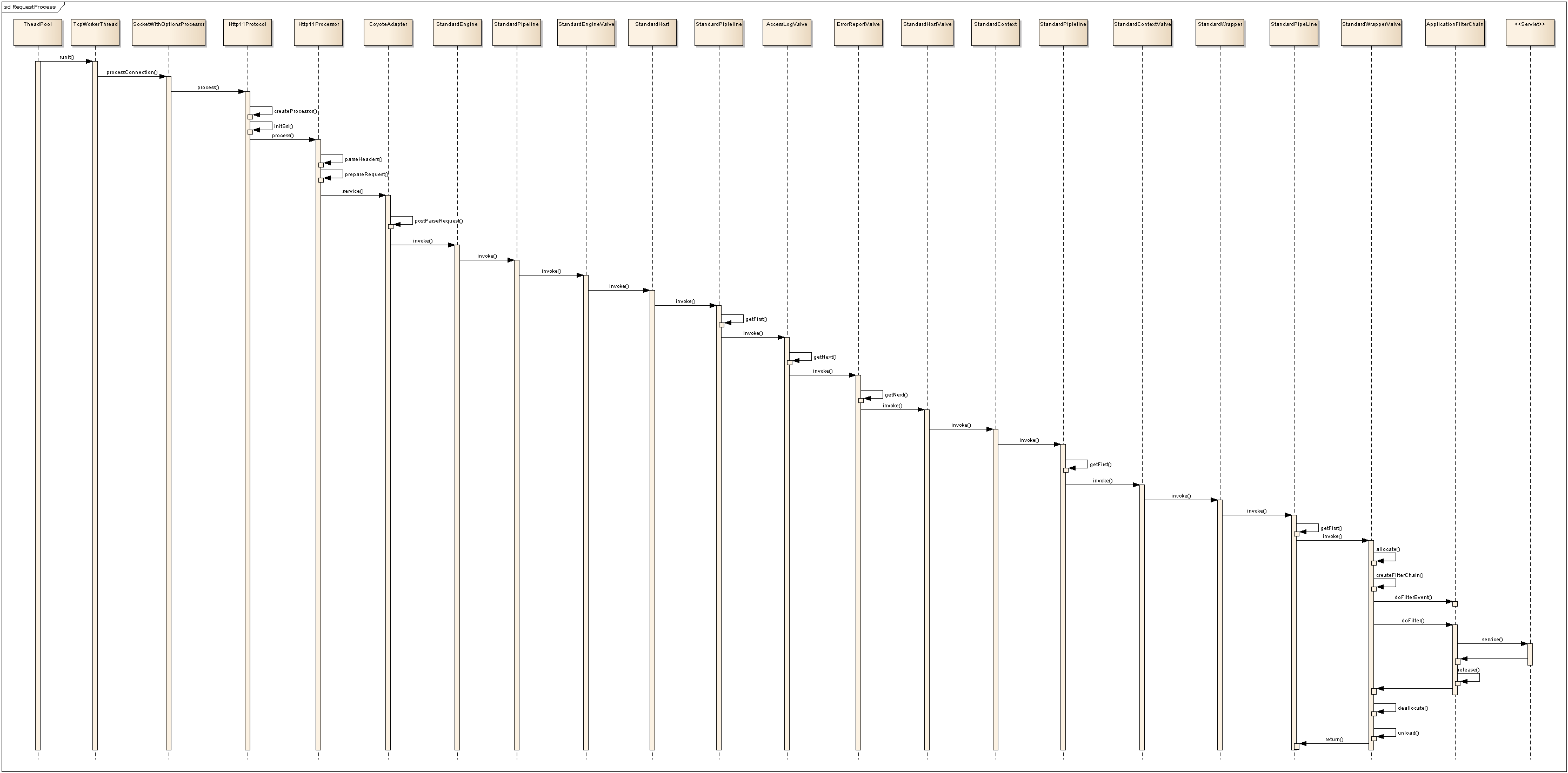
配置tomcat
refresh 加载spring 配置,即配置web容器的工厂
@Configuration(proxyBeanMethods = false) class ServletWebServerFactoryConfiguration { @Configuration(proxyBeanMethods = false) @ConditionalOnClass({ Servlet.class, Tomcat.class, UpgradeProtocol.class }) @ConditionalOnMissingBean(value = ServletWebServerFactory.class, search = SearchStrategy.CURRENT) public static class EmbeddedTomcat { @Bean public TomcatServletWebServerFactory tomcatServletWebServerFactory( ObjectProvider<TomcatConnectorCustomizer> connectorCustomizers, ObjectProvider<TomcatContextCustomizer> contextCustomizers, ObjectProvider<TomcatProtocolHandlerCustomizer<?>> protocolHandlerCustomizers) { TomcatServletWebServerFactory factory = new TomcatServletWebServerFactory(); factory.getTomcatConnectorCustomizers() .addAll(connectorCustomizers.orderedStream().collect(Collectors.toList())); factory.getTomcatContextCustomizers() .addAll(contextCustomizers.orderedStream().collect(Collectors.toList())); factory.getTomcatProtocolHandlerCustomizers() .addAll(protocolHandlerCustomizers.orderedStream().collect(Collectors.toList())); return factory; } } ... }
onRefresh 通过工厂创建 web容器
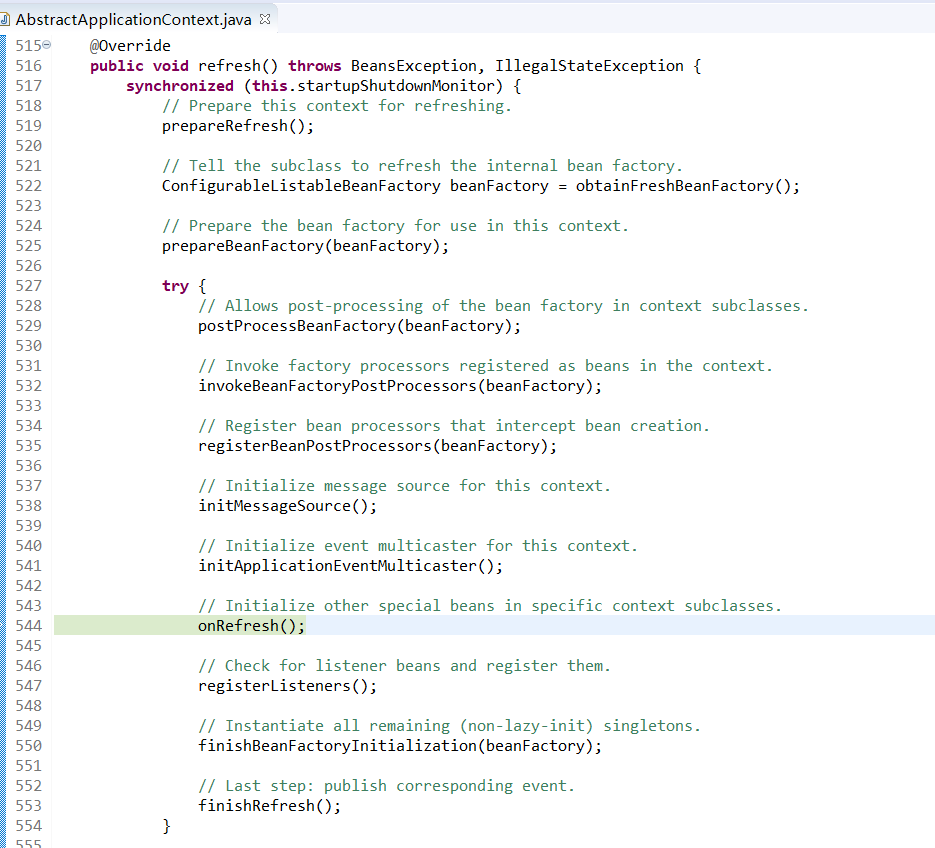

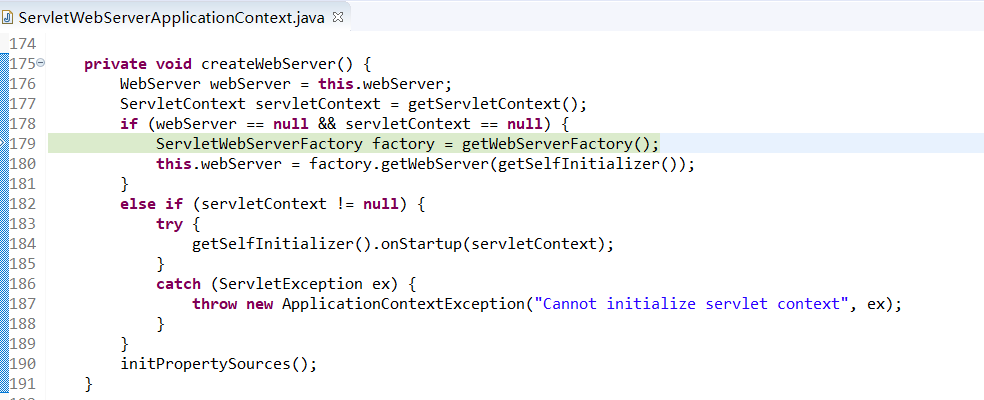


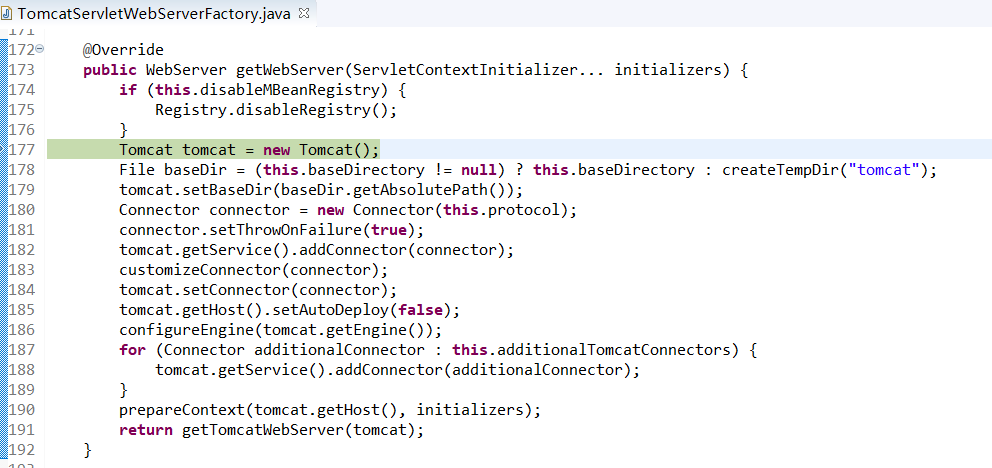
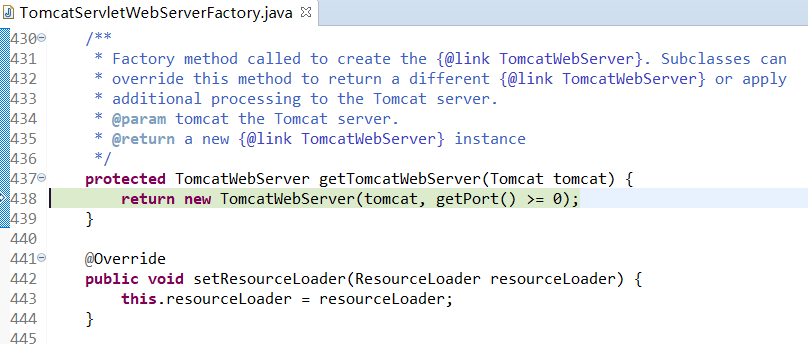
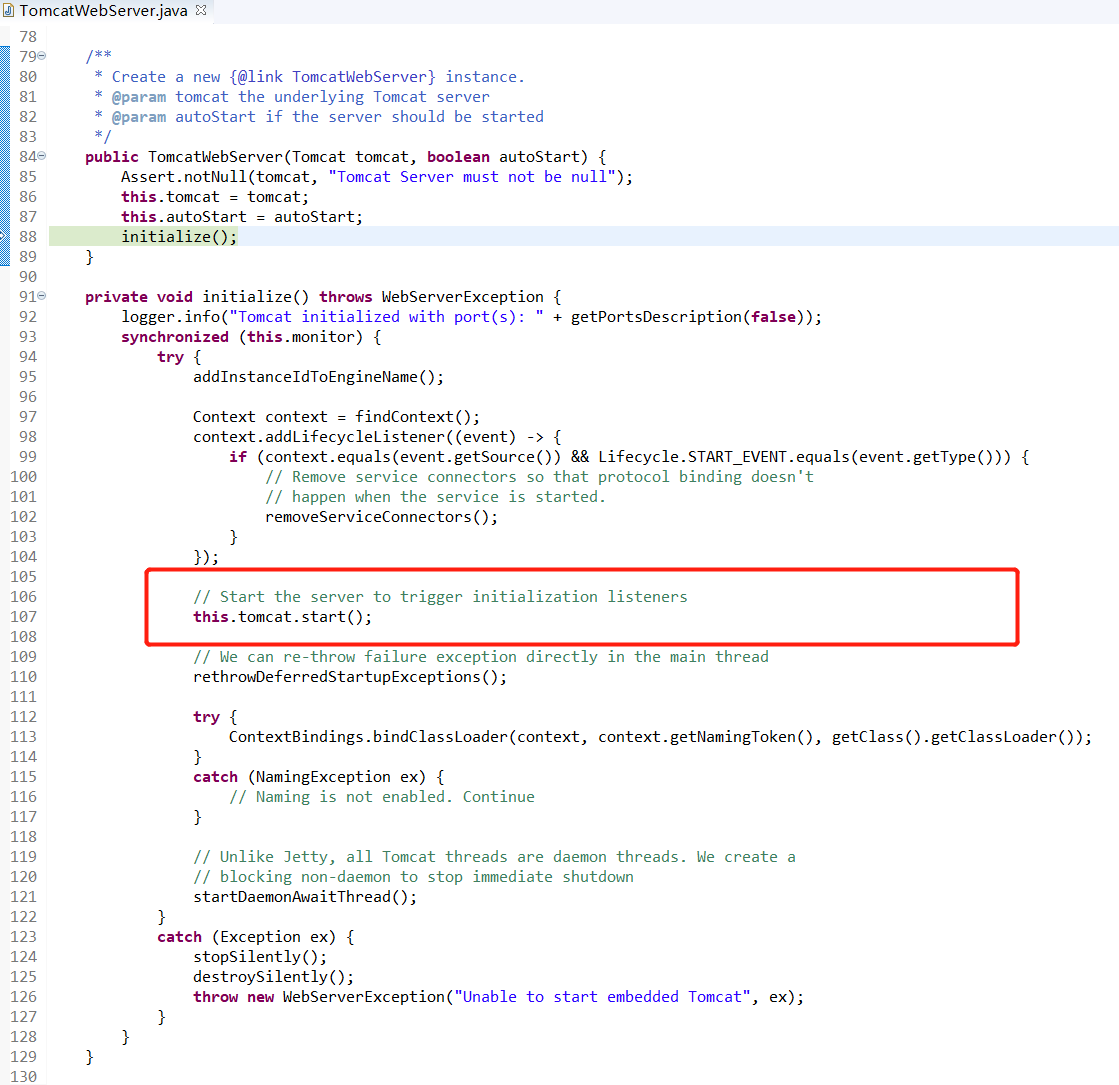
2023-05-14 21:38:07,312 INFO org.springframework.boot.web.embedded.tomcat.TomcatWebServer [#] - Tomcat initialized with port(s): 8080 (http)
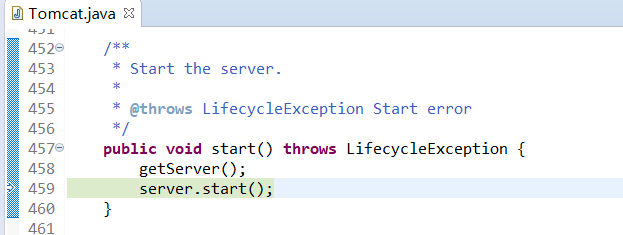
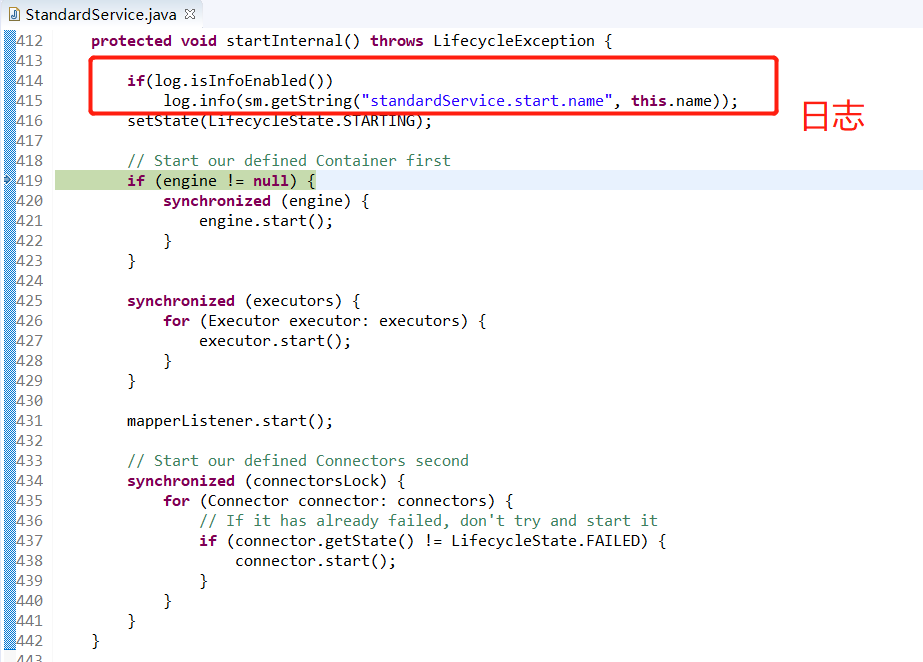
2023-05-14 21:56:56,606 INFO org.apache.catalina.core.StandardService [#] - Starting service [Tomcat]
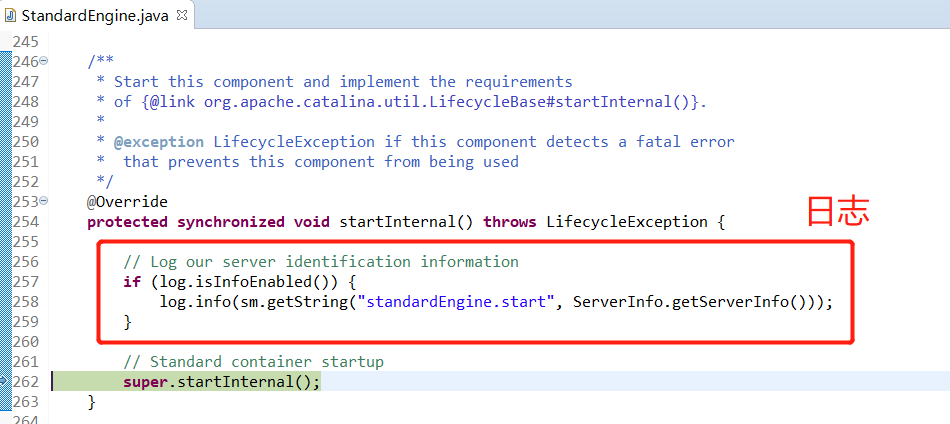
2023-05-14 22:00:25,377 INFO org.apache.catalina.core.StandardEngine [#] - Starting Servlet engine: [Apache Tomcat/9.0.29]
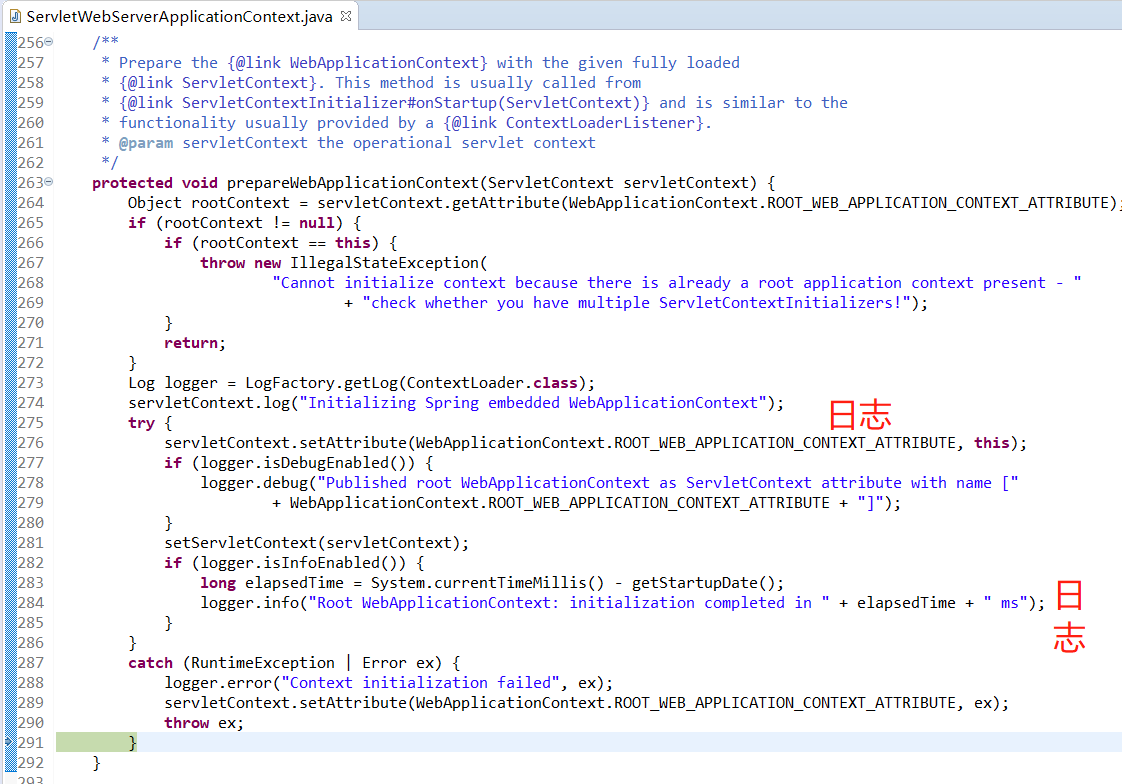
2023-05-14 22:14:51,411 INFO org.apache.catalina.core.ContainerBase.[Tomcat].[localhost].[/] [#] - Initializing Spring embedded WebApplicationContext 2023-05-14 22:14:57,601 INFO org.springframework.web.context.ContextLoader [#] - Root WebApplicationContext: initialization completed in 15777 ms
filter 是在start() 方法中初始化的
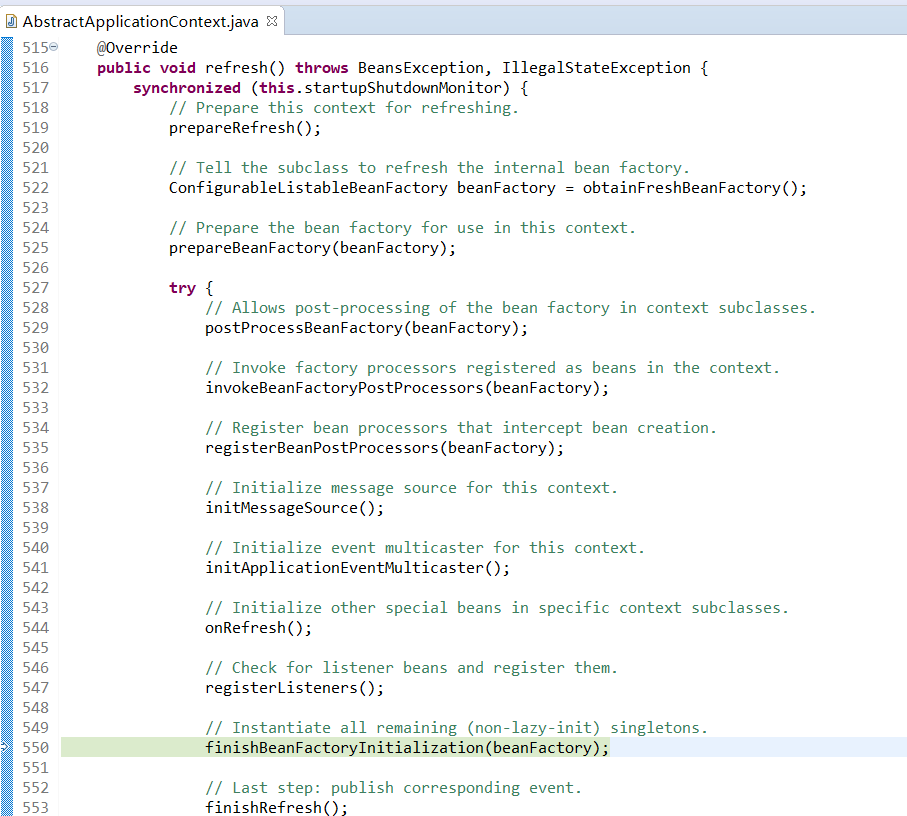
随后初始化单例组件,比如aspect 、service、datasource 等
首次请求tomcat
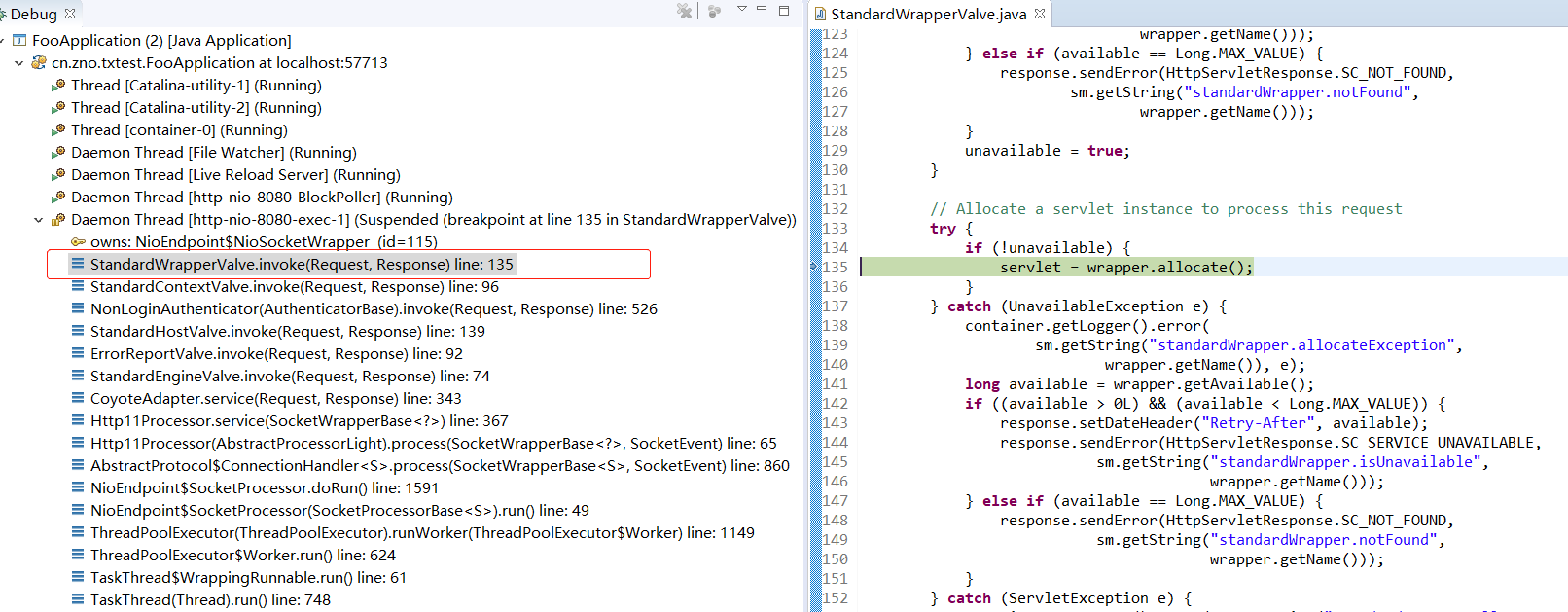
线程池,Http11Processor 发起请求时,servlet未初始化,先进行初始化
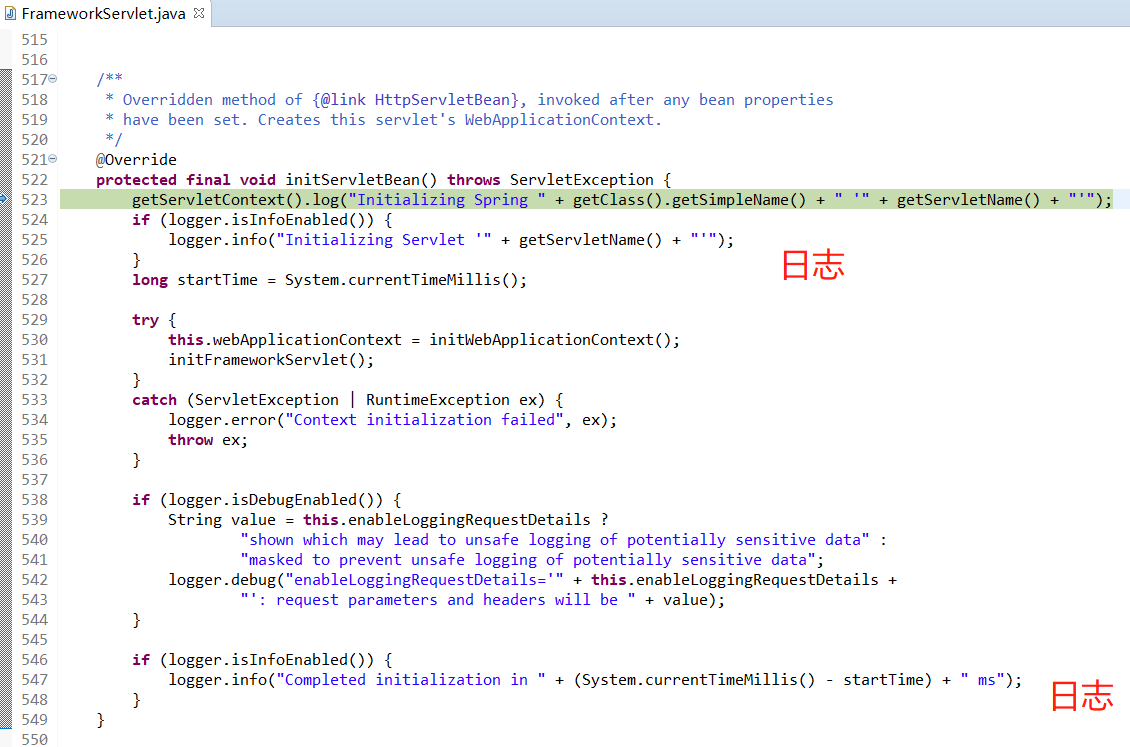
2023-05-14 22:19:15,993 INFO org.apache.catalina.core.ContainerBase.[Tomcat].[localhost].[/] [#] - Initializing Spring DispatcherServlet 'dispatcherServlet' 2023-05-14 22:19:16,837 INFO org.springframework.web.servlet.DispatcherServlet [#] - Initializing Servlet 'dispatcherServlet' 2023-05-14 22:19:19,413 INFO org.springframework.web.servlet.DispatcherServlet [#] - Completed initialization in 2391 ms
初始化完毕后,执行过滤器链
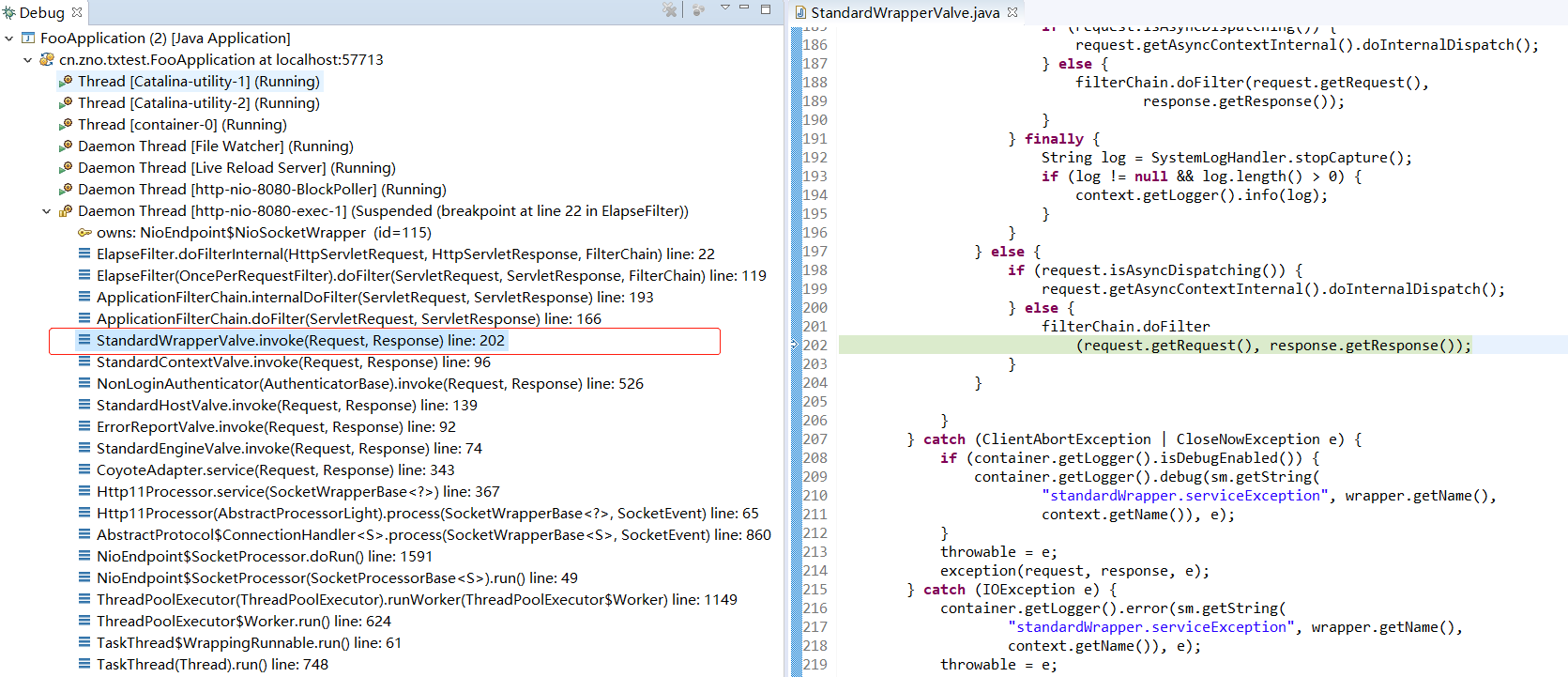
链执行的逻辑如下(org.apache.catalina.core.ApplicationFilterChain.internalDoFilter(ServletRequest, ServletResponse)):
- Chain 记录过滤器个数n,从下标0开始逐个调用,调用完毕后执行servlet.service 方法
- pos The int which is used to maintain the current position in the filter chain.
- n The int which gives the current number of filters in the chain.
private void internalDoFilter(ServletRequest request, ServletResponse response) throws IOException, ServletException { // Call the next filter if there is one if (pos < n) { ApplicationFilterConfig filterConfig = filters[pos++]; ... Filter filter = filterConfig.getFilter(); ... filter.doFilter(request, response, this); ... return; } // We fell off the end of the chain -- call the servlet instance ... servlet.service(request, response); ... }
service 调用过程(一种模式,第一列是依次调用的方法,后面从左往右是继承和实现


@Override public void service(ServletRequest req, ServletResponse res) throws ServletException, IOException { HttpServletRequest request; HttpServletResponse response; try { request = (HttpServletRequest) req; response = (HttpServletResponse) res; } catch (ClassCastException e) { throw new ServletException(lStrings.getString("http.non_http")); } service(request, response); }

/** * Override the parent class implementation in order to intercept PATCH requests. */ @Override protected void service(HttpServletRequest request, HttpServletResponse response) throws ServletException, IOException { HttpMethod httpMethod = HttpMethod.resolve(request.getMethod()); if (httpMethod == HttpMethod.PATCH || httpMethod == null) { processRequest(request, response); } else { super.service(request, response); } }

/** * Receives standard HTTP requests from the public * <code>service</code> method and dispatches * them to the <code>do</code><i>Method</i> methods defined in * this class. This method is an HTTP-specific version of the * {@link javax.servlet.Servlet#service} method. There's no * need to override this method. * * @param req the {@link HttpServletRequest} object that * contains the request the client made of * the servlet * * @param resp the {@link HttpServletResponse} object that * contains the response the servlet returns * to the client * * @exception IOException if an input or output error occurs * while the servlet is handling the * HTTP request * * @exception ServletException if the HTTP request * cannot be handled * * @see javax.servlet.Servlet#service */ protected void service(HttpServletRequest req, HttpServletResponse resp) throws ServletException, IOException { String method = req.getMethod(); if (method.equals(METHOD_GET)) { long lastModified = getLastModified(req); if (lastModified == -1) { // servlet doesn't support if-modified-since, no reason // to go through further expensive logic doGet(req, resp); } else { long ifModifiedSince; try { ifModifiedSince = req.getDateHeader(HEADER_IFMODSINCE); } catch (IllegalArgumentException iae) { // Invalid date header - proceed as if none was set ifModifiedSince = -1; } if (ifModifiedSince < (lastModified / 1000 * 1000)) { // If the servlet mod time is later, call doGet() // Round down to the nearest second for a proper compare // A ifModifiedSince of -1 will always be less maybeSetLastModified(resp, lastModified); doGet(req, resp); } else { resp.setStatus(HttpServletResponse.SC_NOT_MODIFIED); } } } else if (method.equals(METHOD_HEAD)) { long lastModified = getLastModified(req); maybeSetLastModified(resp, lastModified); doHead(req, resp); } else if (method.equals(METHOD_POST)) { doPost(req, resp); } else if (method.equals(METHOD_PUT)) { doPut(req, resp); } else if (method.equals(METHOD_DELETE)) { doDelete(req, resp); } else if (method.equals(METHOD_OPTIONS)) { doOptions(req,resp); } else if (method.equals(METHOD_TRACE)) { doTrace(req,resp); } else { // // Note that this means NO servlet supports whatever // method was requested, anywhere on this server. // String errMsg = lStrings.getString("http.method_not_implemented"); Object[] errArgs = new Object[1]; errArgs[0] = method; errMsg = MessageFormat.format(errMsg, errArgs); resp.sendError(HttpServletResponse.SC_NOT_IMPLEMENTED, errMsg); } }

/** * Delegate GET requests to processRequest/doService. * <p>Will also be invoked by HttpServlet's default implementation of {@code doHead}, * with a {@code NoBodyResponse} that just captures the content length. * @see #doService * @see #doHead */ @Override protected final void doGet(HttpServletRequest request, HttpServletResponse response) throws ServletException, IOException { processRequest(request, response); }

/** * Process this request, publishing an event regardless of the outcome. * <p>The actual event handling is performed by the abstract * {@link #doService} template method. */ protected final void processRequest(HttpServletRequest request, HttpServletResponse response) throws ServletException, IOException { long startTime = System.currentTimeMillis(); Throwable failureCause = null; LocaleContext previousLocaleContext = LocaleContextHolder.getLocaleContext(); LocaleContext localeContext = buildLocaleContext(request); RequestAttributes previousAttributes = RequestContextHolder.getRequestAttributes(); ServletRequestAttributes requestAttributes = buildRequestAttributes(request, response, previousAttributes); WebAsyncManager asyncManager = WebAsyncUtils.getAsyncManager(request); asyncManager.registerCallableInterceptor(FrameworkServlet.class.getName(), new RequestBindingInterceptor()); initContextHolders(request, localeContext, requestAttributes); try { doService(request, response); } catch (ServletException | IOException ex) { failureCause = ex; throw ex; } catch (Throwable ex) { failureCause = ex; throw new NestedServletException("Request processing failed", ex); } finally { resetContextHolders(request, previousLocaleContext, previousAttributes); if (requestAttributes != null) { requestAttributes.requestCompleted(); } logResult(request, response, failureCause, asyncManager); publishRequestHandledEvent(request, response, startTime, failureCause); } }

/** * Exposes the DispatcherServlet-specific request attributes and delegates to {@link #doDispatch} * for the actual dispatching. */ @Override protected void doService(HttpServletRequest request, HttpServletResponse response) throws Exception { logRequest(request); // Keep a snapshot of the request attributes in case of an include, // to be able to restore the original attributes after the include. Map<String, Object> attributesSnapshot = null; if (WebUtils.isIncludeRequest(request)) { attributesSnapshot = new HashMap<>(); Enumeration<?> attrNames = request.getAttributeNames(); while (attrNames.hasMoreElements()) { String attrName = (String) attrNames.nextElement(); if (this.cleanupAfterInclude || attrName.startsWith(DEFAULT_STRATEGIES_PREFIX)) { attributesSnapshot.put(attrName, request.getAttribute(attrName)); } } } // Make framework objects available to handlers and view objects. request.setAttribute(WEB_APPLICATION_CONTEXT_ATTRIBUTE, getWebApplicationContext()); request.setAttribute(LOCALE_RESOLVER_ATTRIBUTE, this.localeResolver); request.setAttribute(THEME_RESOLVER_ATTRIBUTE, this.themeResolver); request.setAttribute(THEME_SOURCE_ATTRIBUTE, getThemeSource()); if (this.flashMapManager != null) { FlashMap inputFlashMap = this.flashMapManager.retrieveAndUpdate(request, response); if (inputFlashMap != null) { request.setAttribute(INPUT_FLASH_MAP_ATTRIBUTE, Collections.unmodifiableMap(inputFlashMap)); } request.setAttribute(OUTPUT_FLASH_MAP_ATTRIBUTE, new FlashMap()); request.setAttribute(FLASH_MAP_MANAGER_ATTRIBUTE, this.flashMapManager); } try { doDispatch(request, response); } finally { if (!WebAsyncUtils.getAsyncManager(request).isConcurrentHandlingStarted()) { // Restore the original attribute snapshot, in case of an include. if (attributesSnapshot != null) { restoreAttributesAfterInclude(request, attributesSnapshot); } } } }

/** * Process the actual dispatching to the handler. * <p>The handler will be obtained by applying the servlet's HandlerMappings in order. * The HandlerAdapter will be obtained by querying the servlet's installed HandlerAdapters * to find the first that supports the handler class. * <p>All HTTP methods are handled by this method. It's up to HandlerAdapters or handlers * themselves to decide which methods are acceptable. * @param request current HTTP request * @param response current HTTP response * @throws Exception in case of any kind of processing failure */ protected void doDispatch(HttpServletRequest request, HttpServletResponse response) throws Exception { HttpServletRequest processedRequest = request; HandlerExecutionChain mappedHandler = null; boolean multipartRequestParsed = false; WebAsyncManager asyncManager = WebAsyncUtils.getAsyncManager(request); try { ModelAndView mv = null; Exception dispatchException = null; try { processedRequest = checkMultipart(request); multipartRequestParsed = (processedRequest != request); // Determine handler for the current request. mappedHandler = getHandler(processedRequest); if (mappedHandler == null) { noHandlerFound(processedRequest, response); return; } // Determine handler adapter for the current request. HandlerAdapter ha = getHandlerAdapter(mappedHandler.getHandler()); // Process last-modified header, if supported by the handler. String method = request.getMethod(); boolean isGet = "GET".equals(method); if (isGet || "HEAD".equals(method)) { long lastModified = ha.getLastModified(request, mappedHandler.getHandler()); if (new ServletWebRequest(request, response).checkNotModified(lastModified) && isGet) { return; } } if (!mappedHandler.applyPreHandle(processedRequest, response)) { return; } // Actually invoke the handler. mv = ha.handle(processedRequest, response, mappedHandler.getHandler()); if (asyncManager.isConcurrentHandlingStarted()) { return; } applyDefaultViewName(processedRequest, mv); mappedHandler.applyPostHandle(processedRequest, response, mv); } catch (Exception ex) { dispatchException = ex; } catch (Throwable err) { // As of 4.3, we're processing Errors thrown from handler methods as well, // making them available for @ExceptionHandler methods and other scenarios. dispatchException = new NestedServletException("Handler dispatch failed", err); } processDispatchResult(processedRequest, response, mappedHandler, mv, dispatchException); } catch (Exception ex) { triggerAfterCompletion(processedRequest, response, mappedHandler, ex); } catch (Throwable err) { triggerAfterCompletion(processedRequest, response, mappedHandler, new NestedServletException("Handler processing failed", err)); } finally { if (asyncManager.isConcurrentHandlingStarted()) { // Instead of postHandle and afterCompletion if (mappedHandler != null) { mappedHandler.applyAfterConcurrentHandlingStarted(processedRequest, response); } } else { // Clean up any resources used by a multipart request. if (multipartRequestParsed) { cleanupMultipart(processedRequest); } } } }
